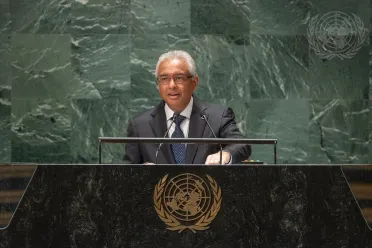Statement
Statement summary
PRAVIND KUMAR JUGNAUTH, Prime Minister of Mauritius, said that the surge in health challenges underscores the importance of global unity. “Scaled-up action to reduce emissions to align with goals set forth in the Paris Agreement is becoming imperative,” he continued. Island States such as his, wrestle with coastal erosion, marine pollution and coral bleaching, while sea-level rise and climate-related disasters loom large. “Mauritius is facing a rise in sea level of 5.6mm annually, almost twice the global average of 3.3mm,” he underscored, saying that his country is spending about 2 per cent of its gross domestic product (GDP) on environment and climate-change related policies. The successful implementation of national determined contributions requires a total of $6.5 billion while Mauritius has been able to commit only $2.5 billion. He urged developed countries to deliver on their promise made at the 2009 Copenhagen Climate Change Conference to provide climate finance of $100 billion per year. “This amount is no longer sufficient, so there is a need to make the scale of climate finance commensurate with the challenge through the New Collective Quantified Goal on Climate Finance”, he stated.
Citing a United Nations report that projects Mauritius to become a water-stressed country by 2025, he said that his Government’s top priority is to ensure the continuous supply of clean and safe water to every citizen. “The ocean, on which we are all dependent, is a critical reservoir of marine biodiversity,” he stressed, welcoming the adoption of the Agreement under the United Nations Convention on the Law of the Sea on the Conservation and Sustainable Use of Marine Biological Diversity of Areas beyond National Jurisdiction and encouraging all countries to sign and ratify the Agreement as soon as possible. “We also look forward to the finalization of the international legally binding instrument on plastic pollution, including in the marine environment, and ensuring its effective implementation,” he said.
Turning to other issues, he said that the instability in some parts of Africa is detrimental to progress, while upholding the rule of law is essential for restoring faith in governance, fostering stability and enabling sustainable progress on the continent. “Peaceful transition of power through democratic means is the only way to ensure peace, development and prosperity,” he emphasized. He also reaffirmed solidarity with the Palestinian people and reiterated support for the two-State solution. Noting that the Security Council has a vital role to play in maintaining international peace and security, he said that it no longer reflects the realities of the modern world. Urgent reform of that organ is needed as well as the revitalization of the General Assembly in order “to strengthen the United Nations for future generations”. On the Ukraine-Russian Federation conflict, he urged the international community to relentlessly pursue peaceful dialogue and commended African nations and other mediators for their vital role in this regard.
“It is now four years since the International Court of Justice gave its advisory opinion on the legal consequences of the separation of the Chagos Archipelago from Mauritius prior to its independence,” he recalled, adding that the Court made it clear the Chagos Archipelago is an integral part of the territory of his country and invited the colonial Power to withdraw its administration from the Archipelago as rapidly as possible. “Indeed, Mauritius and the United Kingdom have started negotiations on the exercise of sovereignty over the Chagos Archipelago, on the basis of international law,” he said, expressing hope that the talks will lead to the completion of the decolonization of Mauritius and also appealing to France to resolve the dispute over Tromelin.
Full statement
Read the full statement, in PDF format.
Photo

Previous sessions
Access the statements from previous sessions.
